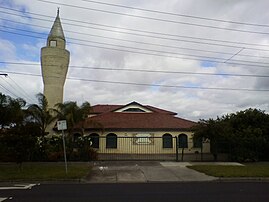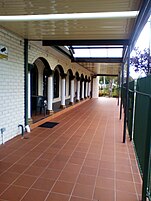
Imam is an Islamic leadership position. For Sunni Muslims, Imam is most commonly used as the title of a prayer leader of a mosque. In this context, imams may lead Islamic prayers, serve as community leaders, and provide religious guidance. Thus for Sunnis, anyone can study the basic Islamic sciences and become an Imam.

Lalor is a suburb in Melbourne, Victoria, Australia, 17 km (11 mi) north of Melbourne's Central Business District, located within the City of Whittlesea local government area. Lalor recorded a population of 23,219 at the 2021 census.

Thomastown is a suburb of Melbourne, Victoria, Australia, 16 km driving distance approximately 30 minutes north of Melbourne's central business district, located within the City of Whittlesea local government area. Thomastown recorded a population of 14,234 at the 2021 census.

The documented history of Islam in the Republic of Ireland dates back to the 1950s. The number of Muslims in the Republic of Ireland has increased since the 1990s, mostly through immigration. For the 2022 Irish census, 81,930 were counted.
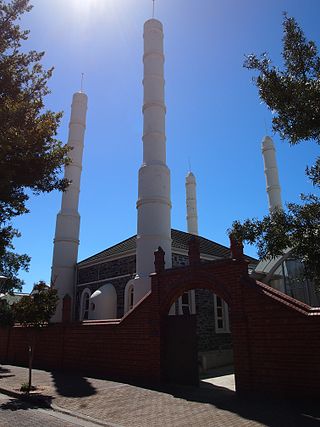
Islam is the second-largest religion in Australia. According to the 2021 Census in Australia, the combined number of people who self-identified as Australian Muslims, from all forms of Islam, constituted 813,392 people, or 3.2% of the total Australian population. That total Muslim population makes Islam, in all its denominations and sects, the second largest religious grouping in Australia, after all denominations of Christianity.

The Presidency of Religious Affairs is a state institution established in 1924 by Mustafa Kemal Atatürk. Initially created to manage religious duties previously overseen by the Shaykh al-Islām during the Ottoman Empire, it later gained formal recognition under Article 136 of the Turkish constitution. The president of the Diyanet, appointed by the president of Turkey, serves as the Grand Mufti of Turkey. This role is supported by a 16-member council elected from among clerics and university theology faculty.

Islam in Greece is represented by two distinct communities; Muslims that have lived in Greece since the times of the Ottoman Empire and Muslim immigrants that began arriving in the last quarter of the 20th century, mainly in Athens and Thessaloniki. Muslims in Greece are mainly immigrants from The Middle East, other Balkan regions, South Asia & North Africa.
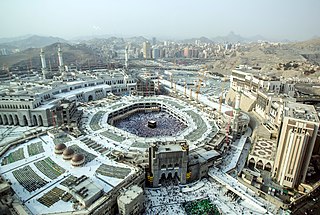
A congregational mosque or Friday mosque, or sometimes great mosque or grand mosque, is a mosque for hosting the Friday noon prayers known as jumu'ah. It can also host the Eid prayers in situations when there is no musalla or eidgah available nearby to host the prayers. In early Islamic history, the number of congregational mosques in one city was strictly limited. As cities and populations grew over time, it became more common for many mosques to host Friday prayers in the same area.
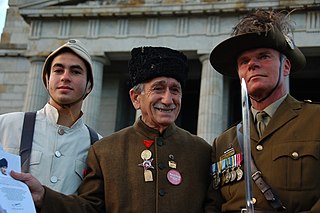
Turkish Australians or Australian Turks are Australians who have emigrated from Turkey or who have Turkish ancestral origins.

The Islamic Society of Boston (ISB) is an organization that runs two mosques in the Boston area. The original mosque called Islamic Society of Boston is in Cambridge, Massachusetts. In 2007, the Islamic Society of Boston Cultural Center (ISBCC) was built in Roxbury, Boston. Both mosques offer daily, weekly and annual programs for Muslims including Arabic and English classes on religious and secular topics. ISB also has a religious school for children and holiday programs. It organizes trips and summer camps for children and classes on Islam for new and non-Muslims.

While Turkey is officially a secular state, numerous surveys all show that Islam is the country's most common religion. Published data on the proportion of people in Turkey who follow Islam vary. Because the government registers everyone as Muslim at birth by default, the official statistics can be misleading. There are many people who follow other religions or do not adhere to any religion, but they are officially classified as 'Muslim' in official records unless they make a contrary claim. These records can be changed or even blanked out on the request of the citizen using a valid electronic signature to sign the electronic application. According to the state, 99.8% of the population is initially registered as Muslim. The remaining 0.2% are Christians and adherents of other officially recognised religions such as Judaism. As much as 90% of the population follows Sunni Islam. Most Turkish Sunni Muslims belong to the Hanafi school of jurisprudence.
Albanian Australians are residents of Australia who have Albanian heritage or descent; many are from Albania and North Macedonia but some are from Kosovo, Montenegro, Greece, Turkey, Bosnia and Italy. Albanian Australians are a geographically dispersed community; the largest concentrations are in the Melbourne suburb Dandenong and in the regional city Shepparton, both of which are in Victoria. The Albanian community has been present in Australia for a long period, and its presence in the country is unproblematic and peaceful.
The Constitution provides for the freedom to practice the rights of one's religion and faith in accordance with the customs that are observed in the kingdom, unless they violate public order or morality. The state religion is Islam. The Government prohibits conversion from Islam and proselytization of Muslims.
The American Society of Muslims was a predominantly African-American association of Muslims which was the direct descendant of the original Nation of Islam. It was created by Warith Deen Mohammed after he assumed leadership of the Nation of Islam upon the death of his father Elijah Muhammad. Warith Deen Mohammed changed the name of the Nation of Islam to the "World Community of Islam in the West" in 1976, then the "American Muslim Mission" in 1981, and finally the "American Society of Muslims" in 1988.
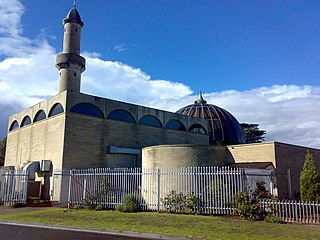
The Preston Mosque, officially the Umar bin Al-Khattab Mosque, is a Sunni Islam mosque located in Preston, a suburb of Melbourne, in Victoria, Australia.
The Grand Mufti of Australia is a Sunni Muslim cleric, or Grand Mufti, chosen to represent and answer questions from the growing Muslim population. Nominated by the Australian National Imams Council (ANIC), the current Grand Mufti of Australia since 2018 is Ibrahim Abu Mohammed. Mohammed previously held the position from 2011–2018, and became Grand Mufti again after his successor, Abdel Aziem Al-Afifi died in office after a four-month tenure.

The Albanian Mosque, also known as the Albanian Australian Islamic Society Mosque and Carlton Mosque, is a mosque located in Carlton North, a suburb of inner Melbourne, Victoria, Australia. The building contains a minaret, and community facilities. Associated with the Albanian Australian community, the mosque is owned by and the centre of the Albanian Australian Islamic Society (AAIS) of Victoria, whose membership numbers some 1000 people. Constructed began in the mid 1960s and was completed by 1969. The mosque is the oldest in Melbourne and listed on the Victorian Heritage Register.

The Albanian Mosque, also known as the Albanian Islamic Centre Mosque and Albanian Sakie Islamic Centre, is a mosque located in Dandenong, a south eastern suburb of Melbourne, Victoria, Australia. It is one of the earliest mosques in the country.

The Mareeba Mosque, officially known as the Mareeba and District Memorial Mosque, is a mosque located in Mareeba, a rural town in Queensland, Australia. The building contains a minaret, and an adjacent hall used for community functions that houses the library and visitors room. Associated with the Albanian Australian community, the mosque is owned by and the centre of the Albanian Australian Moslem Society.


